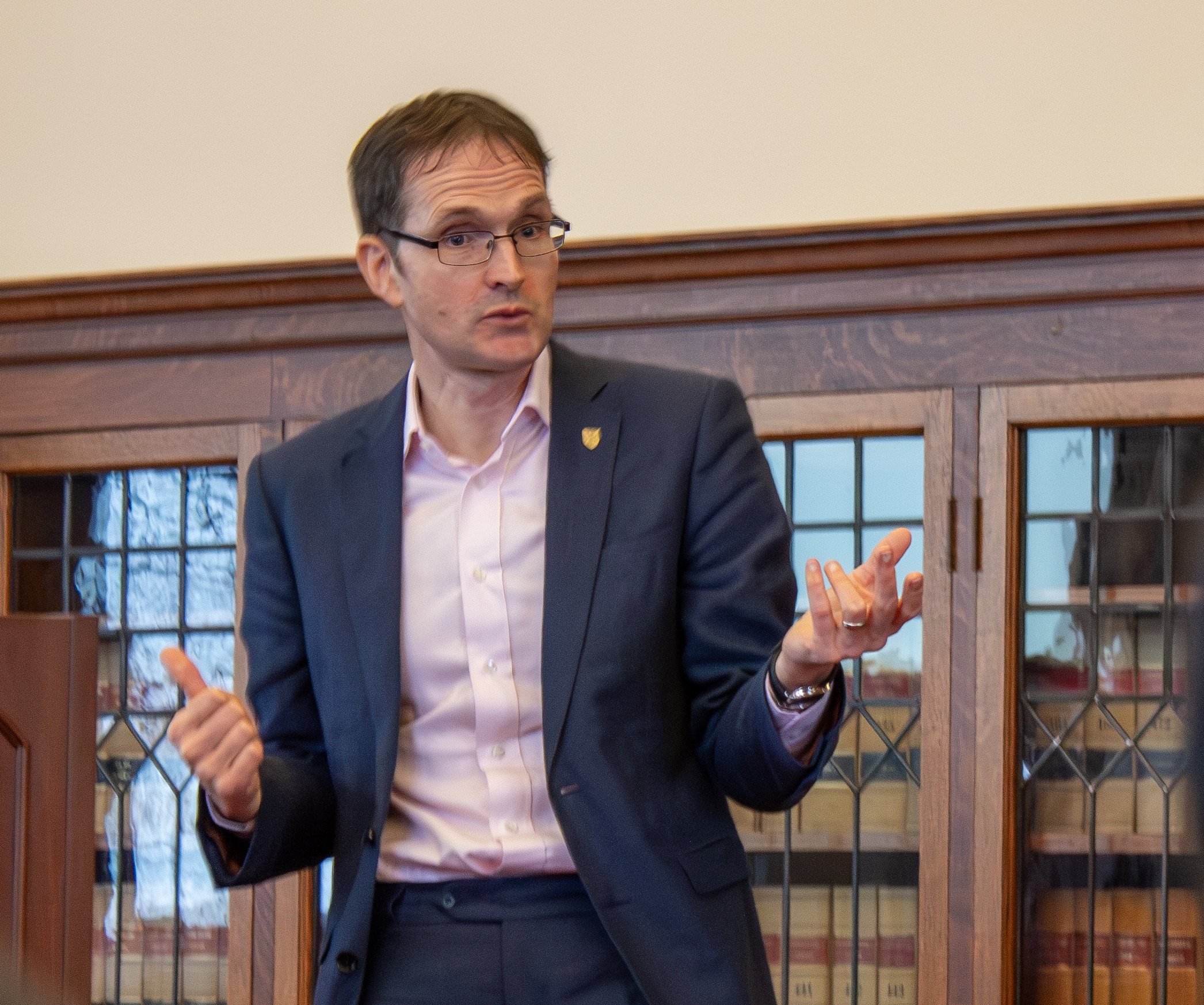From Belfast to Bowdoin: McLoughlin talks about U.S. influence on Northern Irish peace process
March 28, 2025
 Janet Briggs
Janet BriggsWith an ocean separating Maine and Ireland, what could a small college like Bowdoin have to do with Irish history? At Monday’s talk from Peter McLoughlin, a professor at the School of History, Anthropology, Philosophy and Politics at Queen’s University Belfast, attendees got a historical breakdown of the Northern Irish peace process and America’s role in it—from Maine to Washington, D.C.
McLoughlin is a specialist in Irish and Northern Irish history and a fellow of the Senator George J. Mitchell Institute for Global Peace, Security and Justice at Queen’s University Belfast. Most of his research focuses on the Northern Irish conflict and peace process. In 2018, he was a Fulbright scholar at Boston College, where he studied the U.S. influence on the Northern Irish peace process.
The talk began with a video introduction from Sen. George Mitchell ’54, who mediated the peace talks that generated the Good Friday Agreement, the 1998 document that effectively ended the era of conflict in Northern Ireland known as “the Troubles.” Mitchell is now 93 and resides in Florida.
“The agreement was a political compromise—the best that could be achieved at that time. It did not resolve all of the outstanding issues, but it did accomplish the most important objective. It ended the political violence,” Mitchell said. “It created a democratically elected, power-sharing government. It made explicit the principle of consent that the future political status of Northern Ireland is for the people of Northern Ireland to decide in a free and democratic election.”
McLoughlin’s overview of the Troubles started with the famine in the late 19th century, which sparked social upheaval in Ireland that would go on to prompt a larger-scale Irish Revolution in the 1920s and a long 20th century filled with violence. He focused on the Troubles, starting in the 1960s, and the violence that followed into the 1970s and 1980s prior to the peace process under the Clinton administration.
He also discussed how the Civil Rights Movement in America influenced some of the tactics and actions of the Irish Republican Army (IRA) and later Sinn Féin, which he researched while completing his Fulbright.
In addition to this social influence, McLoughlin focused on the U.S. diplomatic influence on the Northern Irish peace process and the passage of the Good Friday Agreement—also known as the Belfast Agreement—particularly emphasizing Mitchell and the Clinton administration’s interactions with Gerry Adams, one of the leaders of Sinn Féin who was partially involved in the IRA. McLoughlin spoke at length about the decision for the U.S. government to offer Gerry Adams a temporary visa to come to diplomatic discussions.
“[The discussions] delivered, because six months later you get an IRA ceasefire because [the visa] allowed Gerry Adams to make the plans. I’d argue this is the most controversial thing the U.S. government ever did. It was very risky at the time,” McLoughlin said. “[Adams] certainly defended IRA violence and yet here was the U.S. government allowing him to come to the U.S. and speak about peace.”
Professor of Government Andrew Rudalevige started planning the talk during his sabbatical at the London School of Economics, when he also spent time at Queen’s University Belfast. He hopes McLoughlin’s campus visit will strengthen the relationship between the College and Queen’s University.
“I did think it would be a nice thing to make sure that people are aware both of Senator Mitchell’s career and the connection, obviously, to Bowdoin and the fact that his papers are here and so forth. That, I think, can only be a good thing in terms of giving people a little inspiration about public service at a time when they might be a little less inspired,” Rudalevige said.
Rachel Scruby ’25 decided to attend the talk after spending time with her friend’s Scottish-Irish family in the Hebrides. She said that hearing them discuss Irish-British politics and Irish history made her want to know more.
“I feel like I’d heard the story of what happened and learned about the history and never really understood it,” Scruby said. “Hearing an actual timeline laid out by someone who really knows what they’re talking about was [helpful].”

Comments
Before submitting a comment, please review our comment policy. Some key points from the policy: